Mindset
Why Vision is Fundamentally Important
The great potential of the Congo. While in the Congo I met with people and led workshops in the highest levels of government and business. We talked about how to take the 2nd poorest country on earth to both an African and world leader. It’s the same process you need to grow your own business.

The great potential of the Congo
While in the Congo I met with people and led workshops in the highest levels of government and business. We talked about how to take the 2nd poorest country on earth to both an African and world leader. It’s the same process you need to grow your own business.
Kinshasa has 11 million people, not a single working street light, no waste disposal, at least 70% without running water, long daily electricity outages, no zoning, high crime, millions out of work, many going to work and not getting paid, pollution, dirt, and an extremely worn appearance.
That’s what most people see. The problem is that is only part of the story and if you want to grow a successful economy or a successful business, you won’t see things with these eyes.
For 11 days driving around Kinshasa we saw unbelievable potential (their economy is growing by 10-20% a year – how’s ours doing?); business opportunities everywhere – it was difficult to decide which ones to grab first.
As my very visionary Congolese friend, Emmanuel, and I worked our way through 10 days of meetings, we talked about vision, and how fundamental it is to creating success at any level; whether a street vendor, a small business, a giant corporation, a country’s economy. One large corporation president there told us “We’re just trying to survive.” They never will that way.
I presented to the 36 members of the DR Congo’s government Ministry charged with encouraging investment in the Congo. It was quite an honor. I shared what Emmanuel and I had been talking about as we drove every day through Kinshasa. Vision was critical and this Ministry must have it and be one of the leaders for the Congo in bringing Congo to the leadership position it will eventually (possibly quickly) have in Africa.
And the same process works for any small, local business.
I told the Ministry team that Emmanuel and I drove around Kinshasa using a three step process of developing a vision for the future of the city and the country.
Step 1 – What IS. We didn’t pretend things were what they weren’t. The first step in developing a vision for the future of the Congo (and your business), is to face what IS and understand it fully. Most of us don’t have a sane assessment of where we and our business are. We likely don’t even want to know. But until you know what your revenue is, the trend (up or down?), gross profit, net profit, and cashflow, you’re not going to go anywhere. And you have to know your own strengths and challenges as well. Knowing what IS, is the first critical step.
Step 2 – What COULD be. Once we faced the reality of what we were looking at in the streets, we then put that aside and created a picture of what COULD be in the next five to ten years. This is the dreaming phase of re-discovering where your business needs to go. Don’t look at what IS when you’re doing this – dream big and get a clear picture of what COULD be. Most of us won’t allow ourselves to dream big. We kill the dream before it forms by dragging what IS (or usually a distorted picture of what IS) into the middle of our focus.
Step 3 – What WILL be. Step two is dreaming. Step three is visioning. Look at both What IS and what COULD be, and then decide what you will commit to making come true, and when you will make it come true. We rarely envision with commitment, and we almost never put a date on it. Unless we do, we’re never going to figure out where we want to end up.
This is about the Law of Intentionality. We get what we intend, not what we hope (dream) for. Make a decision, put a date on it and go public – tell others. Until you commit strongly to what WILL be, you’re still dreaming.
What IS creates drag on our future. What COULD be creates false hope. What WILL be is all up to you and is where the successful business owner invests most of their mental, physical and emotional energy.
Victims focus on what IS – “We’re just trying to survive.” Dreamers focus on what COULD be – “Wouldn’t it be nice if…?” But Visionaries focus on what WILL be, and believe they can make it happen because they understand the truth:
Circumstances don’t make me who I am. How I respond to them does. Life is 10% what happens to you and 90% what you make happen.
We finished the meeting with the whole staff shouting We CAN! We WILL! and then We DID! That’s a room full of visionaries.
What do you see in your business and your life that WILL be – the you fully intend to make happen, and are already moving toward? Unless you’ve got your finger on that, you’re going to stay on the treadmill.
What IS, What COULD be, and most importantly what WILL be.
Dreamers talk, visionaries walk. Getting walking toward your clear vision of what WILL be.






